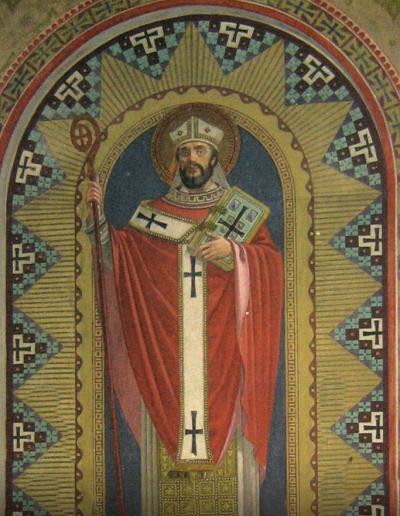
Saint of the Day December 30: St. Eugene of Milan
St. Eugene of Milan: Life and Legacy of the Bishop and Defender of the Christian Faith
Name
St. Eugene of Milan
Title
Bishop
Birth
8th Century, Milan
Death
8th Century, Milan
Recurrence
30 December
Roman Martyrology
In Milan Saint Eugene, Bishop and Confessor.
The Saint and Mission
St. Eugene of Milan, who served as a bishop in the fifth century, is a figure who reflects the heart of Christian mission through his service, leadership and commitment to the faith. In a time of transition and challenge for the Church, his ministry offers valuable insights into how to live and promote the Gospel call in complex contexts.
St. Eugene’s mission was first and foremost characterized by his role as pastor and leader of the Christian community of Milan. As bishop, he faced not only spiritual challenges, but also social and political ones that affected his diocese. His ability to lead his community through turbulent times, maintaining a firm adherence to orthodoxy and promoting unity and peace, reflects a deep sense of mission and pastoral responsibility.
In addition, St. Eugene was distinguished for his commitment to the defense of the faith. In a period marked by heresies and theological debates, his voice was crucial in defending Orthodox doctrine and protecting his community from potentially divisive influences. This part of his mission was not just a matter of intellectual debate; it was a way of caring for the flock entrusted to him, making sure they remained firmly anchored in the truth of the Gospel.
St. Eugene also showed a special concern for the needy and vulnerable. His ministry included acts of charity and support, reflecting Christ’s teaching on love of neighbor. This aspect of his mission emphasizes that caring for others, especially the weakest, is an integral part of the Christian life and its evangelical mandate.
The life and ministry of St. Eugene of Milan illustrate how Christian mission is manifested through wise leadership, courageous defense of the faith, and a practical commitment to service. His example inspires us to consider how we can embody Christ’s mission in our own lives by serving our community with love, leadership and dedication.
The Saint and Mercy
St. Eugene of Milan, bishop of the city in the fifth century, is a figure who embodied mercy through his ministry and commitment to the church and community. Although specific details about his life may be limited, his role as a religious leader in a time of great change and challenge offers a significant perspective on mercy as an essential element of Christian leadership.
St. Eugene’s mercy was manifested primarily in his role as pastor of his diocese. As bishop, he was responsible not only for the spiritual leadership of his faithful, but also for their moral and material well-being. This commitment reflects an understanding of mercy not only as a feeling of compassion, but as concrete action aimed at improving people’s lives.
Moreover, his era was marked by theological controversies and divisions within the Church. St. Eugene stood out for his ability to navigate these turbulent times with wisdom and firmness, upholding orthodoxy and working for the unity of the Church. His dedication to truth and unity was itself an act of mercy, seeking to protect the faithful from confusion and to guide them to a deeper understanding of the faith.
St. Eugene’s life, moreover, is marked by his endurance and resilience in the face of difficulties. The persecutions and exiles he suffered because of his convictions and fidelity to the Church demonstrate a deep commitment to justice and mercy. His example teaches us that mercy sometimes requires courage and sacrifice, and that defending truth and justice is a fundamental component of merciful love.
The figure of St. Eugene of Milan reminds us that mercy is a vital aspect of Christian ministry. His life as a bishop, defender of the faith and compassionate pastor inspires us to consider how we can live mercy in our own context, seeking to guide, protect and support others with love, wisdom and dedication.
Hagiography
There is no certain information about him; from Landulf Senor we know that he was a bishop who came to Italy in the retinue of Charlemagne, whose spiritual father he was also.
He was credited with defending, during a council in Rome, the Ambrosian Rite against attempts to abolish it made by Pope Hadrian I and Charlemagne himself. To settle the matter, the fathers gathered in council decided to place on the altar of St. Peter’s basilica the two missals Roman and…
